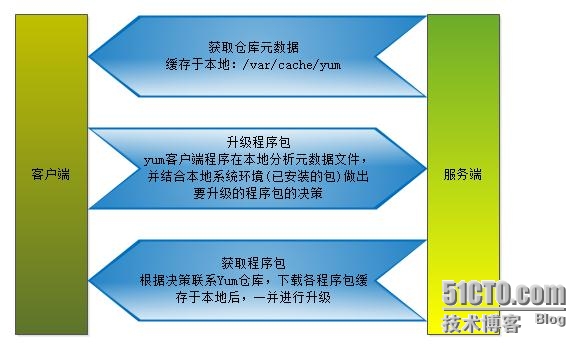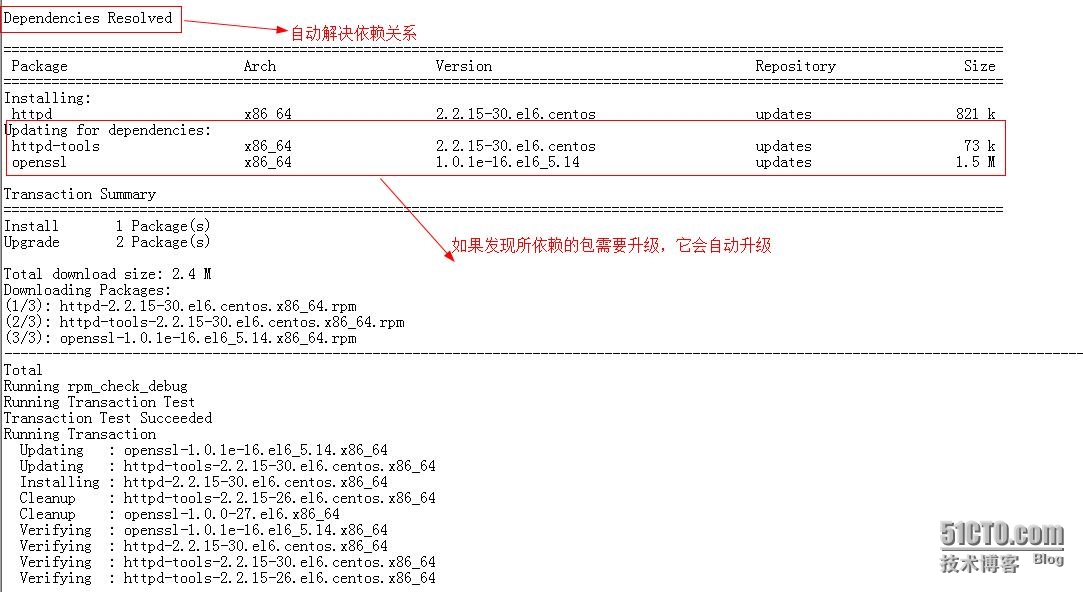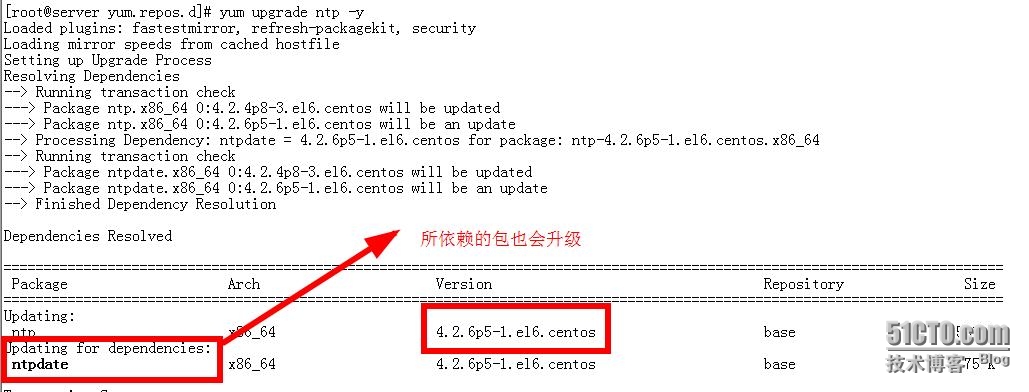Linux软件包的管理--YUM
在上一篇博客《Linux软件包的管理--RPM包管理器》中详细讲述了RPM,但是存在一个问题?就是RPM不能自动解决软件包之间的依赖性。所以就出现了增强版的RPM管理器-YUM。
以下讲解以CentOS6系列为例。
一、YUM介绍
YUM(Yellowdog Updater Modified)是一种C/S架构,它为什么就能自动解决依赖性关系呢?这取决于 YUM 服务端的RPM仓库,在这个仓库里放着我们经常用到的rpm格式的软件包。
1、yum仓库的组成
| 组成 | 内容 |
| 数据 | 存放各个rpm包 |
| 元数据 | 包名、版本信息、依赖关系、包分组信息、依赖关系列表。 在centos6中遵循sqlite格式,生成的元数据目录是repodata。 |
2、yum客户端如何访问服务端
以升级为例:
3、如何配置yum的服务端和客户端
1)在服务器端
首先:在服务器端要确保有可用的yum仓库。yum仓库其实就是文件服务器。repodata目录所在的父目录就是一个yum仓库。
其次:服务器端必须通过某种手段将yum仓库共享出去,可以让客户端使用,常见的共享方式有:ftp,http,nfs。如果是本地使用(客户端和服务端是同一台机器),也可以使用file方式。
2)yum客户端
提供repo配置文件,指明仓库访问路径及各种属性。主配置文件(中心配置文件):/etc/yum.conf。
# 在这里定义一些默认配置属性和全局配置属性 [main] cachedir=/var/cache/yum/$basearch/$releasever keepcache=0 debuglevel=2 logfile=/var/log/yum.log exactarch=1 obsoletes=1 gpgcheck=1 plugins=1 installonly_limit=5 bugtracker_url=http://bugs.centos.org/set_project.php?project_id=16&ref=http://bugs.centos.org/bug_report_page.php?category=yum distroverpkg=centos-release
一个后几个相关的仓库的配置保存成一个文件,文件名都以.repo结尾,保存在/etc/yum.repo.d目录中。
下面介绍一下文件格式(以163镜像为例):
[base] # 指明仓库名称,用户可自行定义
name=CentOS-$releasever - Base - 163.com # 一般是对这个仓库名称的说明
# 最关键的是这一项,指明仓库的访问路径
# 为了配置方便,yum引入了变量,yum配置文件中可用的四个变量:
# releasever: 程序的版本,对Yum而言指的是redhat-release版本;只替换为主版本号,如RedHat 6.5,则替换为6;
# arch: 系统架构
# basearch: 系统基本架构,如i686,i586等的基本架构为i386;
# YUM0-9: 在系统中定义的环境变量,可以在yum中使用;
# 最常用的就是 releasever 和 basearch
# 下面在访问的时候会被替换成:baseurl=# baseurl可以使用多个:例如
# baseurl=# # 使用多个baseurl时需要用到以上格式
baseurl=http://mirrors.163.com/centos/$releasever/os/$basearch/
# mirrorlist=http://mirrorlist.centos.org/?release=$releasever&arch=$basearch&repo=os
# baseurl和mirrlist通常只需一个,我们一般配置baseurl
gpgcheck=1 # 是否进行gpg检测(包的完整性和合法性)
gpgkey= # gpg检测是的秘钥文件
# 还有其他选型,读者在配置时,可自行选择
# 常用的还有:
# enable={0|1} 是否启用该仓库
# cost=N 配置仓库的”花费“,等价于优先级。N的指越小,优先级越高。 配置好这些准备工作,就可以使用yum工具了。
三、yum工具的使用
这里以互联网163镜像为例演示。
1、列出所有可用repo
yum repolist {enabled|disabled|all}
# yum repolist {enabled|disabled|all}
# enabled 列出可用的
# disabled 不可用的
# all所有的
[root@server yum.repos.d]# yum repolist
Loaded plugins: fastestmirror, refresh-packagekit, security
Loading mirror speeds from cached hostfile
base | 3.7 kB 00:00
extras | 3.4 kB 00:00
updates | 3.4 kB 00:00
repo id repo name status
base CentOS-6 - Base - 163.com 6,367
extras CentOS-6 - Extras - 163.com 14
updates CentOS-6 - Updates - 163.com 1,153
repolist: 7,5342、列出rpm包
yum list {all|installed|available}
# yum list {all|installed|available}
# all 列出所有的包 等价于 yum list
# installed 列出已安装的包
# available 列出可用的包(不包括已安装的)
# 一般情况下,会这样使用
[root@server yum.repos.d]# yum list installed | grep "http"
httpd.x86_64 2.2.15-26.el6.centos
httpd-tools.x86_64 2.2.15-26.el6.centos3、包的描述信息
yum info package_name
Loading mirror speeds from cached hostfile Installed Packages Name : httpd Arch : x86_64 Version : 2.2.15 Release : 26.el6.centos Size : 2.9 M Repo : installed From repo : anaconda-CentOS-201303050102.x86_64 Summary : Apache HTTP Server URL : http://httpd.apache.org/ License : ASL 2.0 Description : The Apache HTTP Server is a powerful, efficient, and extensible : web server. Available Packages Name : httpd Arch : x86_64 Version : 2.2.15 Release : 30.el6.centos Size : 821 k Repo : updates Summary : Apache HTTP Server URL : http://httpd.apache.org/ License : ASL 2.0 Description : The Apache HTTP Server is a powerful, efficient, and extensible : web server.
4、列出所有的包组信息
yum grouplist
# 经常情况下我们会是这样来使用 [root@server yum.repos.d]# yum grouplist | grep "Deve" Additional Development Desktop Platform Development Development tools Server Platform Development
5、显示包组的信息:例如组中包含的程序包列表
yum groupinfo "GROUP NAME"
[root@server yum.repos.d]# yum groupinfo "Development tools" Loaded plugins: fastestmirror, refresh-packagekit, security Setting up Group Process Loading mirror speeds from cached hostfile Group: Development tools Description: A basic development environment. Mandatory Packages: autoconf automake binutils bison flex gcc gcc-c++ gettext libtool make patch pkgconfig redhat-rpm-config rpm-build Default Packages: byacc cscope ctags cvs diffstat doxygen elfutils gcc-gfortran git indent intltool patchutils rcs subversion swig systemtap Optional Packages: ElectricFence ant babel bzr chrpath cmake compat-gcc-34 compat-gcc-34-c++ compat-gcc-34-g77 cvs-inetd dejagnu expect gcc-gnat gcc-java gcc-objc gcc-objc++ imake jpackage-utils kdewebdev ksc libstdc++-docs mercurial mod_dav_svn nasm perltidy python-docs rpmdevtools rpmlint systemtap-sdt-devel systemtap-server
6、清理缓存
yum clean {all|packages|metadata|expire-cache|rpmdb|plugins}
# yum clean {all|packages|metadata|expire-cache|rpmdb|plugins}
# all 所有缓存
# packages 清除包缓存
# metedata 清除元数据缓存
# expire-cache 清除过期缓存
# rpmdb 清除RPM数据库缓存
# plufins 清除插件缓存
# 最常用的就是 yum clean all
[root@server yum.repos.d]# yum clean all
Loaded plugins: fastestmirror, refresh-packagekit, security
Cleaning repos: base extras updates
Cleaning up Everything
Cleaning up list of fastest mirrors7、安装程序包
yum install package_name
yum install httpd -y # 常用选项是 -y 意思是不需要确认,直接安装
重新安装:
yum reinstall package_name
yum reinstall httpd -y
8、升级
yum check-update: 检查可用的升级包
yum update package_name 升级软件
[root@server yum.repos.d]# rpm -q ntp ntp-4.2.6p5-1.el6.centos.x86_64
yum downgrade package_name 降级使用的,退回原来的版本
# yum downgrade ntp -y 降级第一次可能会出现错误,解决办法之一是:yum upgrade -y 升级yum工具 [root@server yum.repos.d]# yum downgrade ntp -y Loaded plugins: fastestmirror, refresh-packagekit, security Setting up Downgrade Process Loading mirror speeds from cached hostfile Only Upgrade available on package: ntp-4.2.6p5-1.el6.centos.x86_64 Nothing to do
9、卸载
yum remove|erase package_name
yum remove httpd -y
10、查询某文件是由哪个包安装生成的
yum whatprovides|provides /path/to/somefile
# 会列出所有的提供此配置文件的包 [root@server yum.repos.d]# yum provides /etc/httpd/conf/httpd.conf Loaded plugins: fastestmirror, refresh-packagekit, security Loading mirror speeds from cached hostfile httpd-2.2.15-30.el6.centos.x86_64 : Apache HTTP Server Repo : updates Matched from: Filename : /etc/httpd/conf/httpd.conf httpd-2.2.15-29.el6.centos.x86_64 : Apache HTTP Server Repo : base Matched from: Filename : /etc/httpd/conf/httpd.conf httpd-2.2.15-30.el6.centos.x86_64 : Apache HTTP Server Repo : installed Matched from: Other : Provides-match: /etc/httpd/conf/httpd.conf
11、安装包组
yum groupinstall "GROUP NAME"
# 常用的包有: # Desktop Platform Development 开发平台 # Development tools 开发所用的包 # 例如:yum groupinstall "Development tools" -y
12、卸载包组
yum groupremove "GROUP NAME"
四、自制yum仓库
1、如果作为个人使用的话,最简单的办法是,挂载光盘镜像使用。
以VMware虚拟机为例:
先关联光盘镜像,挂载光盘镜像就可以使用。
其中:.repo中的baseurl使用file就可。例如:baseurl=file:///media/centos
2、自建yum仓库服务器
以ftp为例,步骤:
(1) 安装ftp程序,并启动服务
# rpm -ivh vsftp-版本号
或者
# yum install vsftpd -y
启动服务
# service vsftpd start
# chkconfig vsftpd on
(2) ftp的共享目录为/var/ftp/pub
创建子目录,存放某相关的所有rpm包(建议)
(3) 为仓库生成元数据文件,以使能够作为仓库使用
# rpm -ivh createrepo-版本号
或者
# yum install createrepo -y
# createrepo /path/to/rpm_repo/ 生成repo的元数据目录 例如:createrepo /var/ftp/pub/Packages
(4) 配置yum客户端使用此仓库即可
总结:本文主要介绍yum工具的使用,简单介绍了自制yum服务端的步骤。
本文出自 “逆水寒” 博客,请务必保留此出处http://guoting.blog.51cto.com/8886857/1440326
郑重声明:本站内容如果来自互联网及其他传播媒体,其版权均属原媒体及文章作者所有。转载目的在于传递更多信息及用于网络分享,并不代表本站赞同其观点和对其真实性负责,也不构成任何其他建议。







































